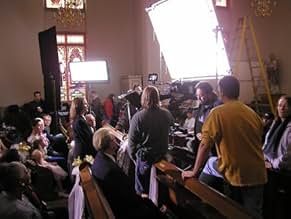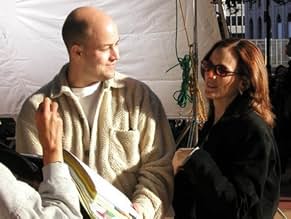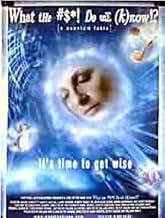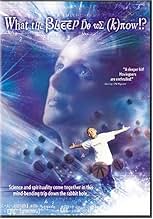IMDb रेटिंग
5.2/10
14 हज़ार
आपकी रेटिंग
अपनी भाषा में प्लॉट जोड़ेंA fictional photographer's quest to spiritually rediscover herself is interspersed with documentary footage of scientists and theologians discussing the philosophical aspects of quantum phys... सभी पढ़ेंA fictional photographer's quest to spiritually rediscover herself is interspersed with documentary footage of scientists and theologians discussing the philosophical aspects of quantum physics.A fictional photographer's quest to spiritually rediscover herself is interspersed with documentary footage of scientists and theologians discussing the philosophical aspects of quantum physics.
- पुरस्कार
- कुल 2 जीत
James Langston Drake
- Groom
- (as Jame Drake)
Michele Mariana
- Tour Guide
- (as Michelle Mariana)
फ़ीचर्ड समीक्षाएं
Okay, cult ties or not, this was an interesting film. It offers up a variety of ideas and leaves it to the viewer to decide whether or not to believe. Visually, it was a beautiful film with great art direction and special effects. Marlee Matlin was effective in the main role, although I thought the "story" detracted from the documentary portion of the film.
As to the film's ties to cults--I didn't see anything coercive or subversive in the film. After viewing it, I'm not ready to sell my soul to some guru. OTOH, I do find myself thinking more about the thoughts I have, and the effect they have on my spirit and body. Moral of the story--take out what you will, and don't join a cult. Duh.
As to the film's ties to cults--I didn't see anything coercive or subversive in the film. After viewing it, I'm not ready to sell my soul to some guru. OTOH, I do find myself thinking more about the thoughts I have, and the effect they have on my spirit and body. Moral of the story--take out what you will, and don't join a cult. Duh.
At first..... I really loved this film - and it's message - until digging a bit deeper. I found evidence that the production staff was actually the front for a New Age group - the Ramtha School on Enlightenment.
My first suspicion that something was wrong ... the scene of the ice crystals purportedly influenced by thought...(?)
Then the blond Hungarian (or whatever that accent was...) seemed to be a "little too dreamy while talking". This should have been expected, though, as she claims to be the channeler of a 35,000 year old man. (I kid you not, find it yourself....)
If you want a jumping off point to decide for yourself, look at Wikipedia and csicop.org.
Now the only remaining wonder I have (after wasting my time on this film) is ... why Dr. David Albert didn't sue the group for misrepresenting him? (His interview was fortuitously edited to support the film's main premise.)
Entertainment, yes - a good time was had by all. And for a time I was also "had". I resent being conned by this pseudo-documentary!
Sorry, Bleep - this goes on the shelf with the Da Vinci Code, Cave of the Ancients, and the writings of Charles Forte.
As a truly great man once said: "Extraordinary claims require extraordinary proof."
My first suspicion that something was wrong ... the scene of the ice crystals purportedly influenced by thought...(?)
Then the blond Hungarian (or whatever that accent was...) seemed to be a "little too dreamy while talking". This should have been expected, though, as she claims to be the channeler of a 35,000 year old man. (I kid you not, find it yourself....)
If you want a jumping off point to decide for yourself, look at Wikipedia and csicop.org.
Now the only remaining wonder I have (after wasting my time on this film) is ... why Dr. David Albert didn't sue the group for misrepresenting him? (His interview was fortuitously edited to support the film's main premise.)
Entertainment, yes - a good time was had by all. And for a time I was also "had". I resent being conned by this pseudo-documentary!
Sorry, Bleep - this goes on the shelf with the Da Vinci Code, Cave of the Ancients, and the writings of Charles Forte.
As a truly great man once said: "Extraordinary claims require extraordinary proof."
It's nice to see that there are some movies being made and released into mainstream theaters that actually make you think. Great fictional films do this through the delivery of their stories, but What the #$*! Do We Know does it in a much more direct way, almost like an educational film. It's a fascinating exploration of existential theories and philosophy, and is one of those very rare movies that will challenge the way you think even about everyday life. It's a strange film and moves entirely too fast for much of it's material to sink in, but it's a great exploration of quantum physics and some of the implications that it has on our lives that we really don't think about, but should.
The story sporadically focuses on the life of Amanda (Marlee Matlin), a deaf woman suffering through heartbreak and work troubles but who ultimately alters her perception by applying certain rules and theories of quantum physics, as I imagine we are expected to after seeing the movie. The great thing about the movie is that it makes you think, but the biggest problem with it is that it uses presentation to make simple statements seem grand and make crazy assertions seem like they have merit.
There is one point where the movie says, "Here's a puzzle - why should we be able to remember the past and not have the same access to the future?'' What is that? A completely obvious fact of linear time is rendered strange just by being in this movie. It's odd that the movie delves so deep into such statuesque disciplines as quantum physics and the very fabric of the universe, while not knowing why you can remember a conversation you had today, but for some weird, unknown and mysterious reason, you can't remember a conversation you will have tomorrow.
The film also makes outlandish claims and then shrouds them in the mysteriousness of unobservable history. There is a part of the movie that claims that when the first ships arrived in what is now North America, the Native Americans looked out to sea and saw the water parted by the ships, but could not see the ships themselves because they had never seen anything like them before. This, obviously, is utter nonsense, but the movie uses it as an example of its suggestion that there are different levels of reality for different people. There is no pure, objective reality, but different plains of existence for different people.
A friend of mine, who hails this as one of the greatest films he's ever seen, explained to me that the Native Americans' minds simply did not understand how to decode the concept of a ship, a signifier which they had never encountered and so it was perfectly understandable that they couldn't see it. Wrong! Sure, they had never seen ships before, but I am willing to go out on a limb and assume that they had seen wood before, and since vision is merely the process of light bouncing off of objects and coming into contact with the retina inside the eye, it is physically impossible for a Native American to have x-ray vision because he or she doesn't know what a certain object is.
My friend used the example that it is not until you learn that lightning travels from the ground to the clouds rather than the other way around that you really begin to see it that way. Before you learn that curious little fact, you see lightning and are completely sure that it's coming out of the clouds and zapping the earth. You do see it differently from then on, it's true, but you did SEE it before you knew where it originated, right? And incidentally, lightning is known to travel from the ground to the clouds, from the clouds to the ground, and from one cloud to another. But when it occurs, I am willing to suggest that it's rarely invisible, even if, as they say, there's no one there to see it.
I believe that the human mind is set up to believe what it wants to believe (hence religion), but I do not feel obliged to believe that people's beliefs or knowledge enable them to see through solid objects just because they've never seen them before, nor do I believe that any human has the ability to change the molecular structure of water just by thinking about it in a certain way, which is another of the more bizarre claims that the movie makes. I don't know, I just never thought of water as susceptible to being offended or made happy, or having any effect over human emotions.
But while the movie does slip up by going a little far in claims like these, it's important to have things like this because even for things like invisible ships, which we know are not reality, it is good that it makes you think about them. There are a lot of things in the world that we take for granted, and not just possessions but truths, and it is movies like What the #$*! Do We Know that really get people thinking about them. For a while, at least.
The story sporadically focuses on the life of Amanda (Marlee Matlin), a deaf woman suffering through heartbreak and work troubles but who ultimately alters her perception by applying certain rules and theories of quantum physics, as I imagine we are expected to after seeing the movie. The great thing about the movie is that it makes you think, but the biggest problem with it is that it uses presentation to make simple statements seem grand and make crazy assertions seem like they have merit.
There is one point where the movie says, "Here's a puzzle - why should we be able to remember the past and not have the same access to the future?'' What is that? A completely obvious fact of linear time is rendered strange just by being in this movie. It's odd that the movie delves so deep into such statuesque disciplines as quantum physics and the very fabric of the universe, while not knowing why you can remember a conversation you had today, but for some weird, unknown and mysterious reason, you can't remember a conversation you will have tomorrow.
The film also makes outlandish claims and then shrouds them in the mysteriousness of unobservable history. There is a part of the movie that claims that when the first ships arrived in what is now North America, the Native Americans looked out to sea and saw the water parted by the ships, but could not see the ships themselves because they had never seen anything like them before. This, obviously, is utter nonsense, but the movie uses it as an example of its suggestion that there are different levels of reality for different people. There is no pure, objective reality, but different plains of existence for different people.
A friend of mine, who hails this as one of the greatest films he's ever seen, explained to me that the Native Americans' minds simply did not understand how to decode the concept of a ship, a signifier which they had never encountered and so it was perfectly understandable that they couldn't see it. Wrong! Sure, they had never seen ships before, but I am willing to go out on a limb and assume that they had seen wood before, and since vision is merely the process of light bouncing off of objects and coming into contact with the retina inside the eye, it is physically impossible for a Native American to have x-ray vision because he or she doesn't know what a certain object is.
My friend used the example that it is not until you learn that lightning travels from the ground to the clouds rather than the other way around that you really begin to see it that way. Before you learn that curious little fact, you see lightning and are completely sure that it's coming out of the clouds and zapping the earth. You do see it differently from then on, it's true, but you did SEE it before you knew where it originated, right? And incidentally, lightning is known to travel from the ground to the clouds, from the clouds to the ground, and from one cloud to another. But when it occurs, I am willing to suggest that it's rarely invisible, even if, as they say, there's no one there to see it.
I believe that the human mind is set up to believe what it wants to believe (hence religion), but I do not feel obliged to believe that people's beliefs or knowledge enable them to see through solid objects just because they've never seen them before, nor do I believe that any human has the ability to change the molecular structure of water just by thinking about it in a certain way, which is another of the more bizarre claims that the movie makes. I don't know, I just never thought of water as susceptible to being offended or made happy, or having any effect over human emotions.
But while the movie does slip up by going a little far in claims like these, it's important to have things like this because even for things like invisible ships, which we know are not reality, it is good that it makes you think about them. There are a lot of things in the world that we take for granted, and not just possessions but truths, and it is movies like What the #$*! Do We Know that really get people thinking about them. For a while, at least.
I wanted to like this film and was prepared for a treat. The visuals and the unusual way of presenting the material was initially stimulating and creative. What made it even easier for me to get involved was that the social ideology advanced closely matches my own. But the expressed connection between particle physics and social prescription was, in my view, either wishful thinking or intellectually dishonest. You can't use the harsh rigors of science to establish credibility and then let your logic go all warm and fuzzy coming to the conclusion you wanted all along -- especially if the conclusion is quite defensible on other bases. As a scientist, I was irritated. As a social liberal, I was embarrassed.
OK, first I'm going to tear down the "Columbus's ships" thing. I'm fairly certain the Caribbeans had some sort of seaworthy craft, such as rafts or canoes. From these, any normal human intelligence can extrapolate their concept of "boat" to include these ships. Also, where did the writer get this story? Source? Since it's not common knowledge, you need a source.
Next is the direction of time question. In Stephen Hawking's "A Brief History of Time," he talks about the 4 arrows of time accepted by the scientific community at large. While it is true that some fundamental (classical/Newtonian) physical laws don't care which direction time is going, many do. The arrow that I remember (it's been a while since I last read the book) is the thermodynamic arrow of time, which causes us to experience events in such a way that the entropy, or disorder, of the universe increases. For example, a cup falls off a table and breaks, not the other way around.
Ah, then the probability discussion. Yes, for subatomic particles like electrons and quarks, the probability wave is spread out enough that the particle can be in >1 place at a time. However, when you look at anything larger than these specks, the waves get exponentially more concentrated, so that a large (visible w/naked eye) object really has an infinitesimal probability of being in more than one state. So small is this probability that you would have to watch a "large" object say, a tennis ball, for more than the present age of the universe (15,000,000,000 years) for it to have an appreciable chance of doing anything strange.
Closely linked to my last paragraph is the talk about particles popping in and out of existence. The answer to "where do they go" is "they turn back into energy." This is what E=mc^2 means. In the "vacuum" of space, particle/antiparticle pairs of subatomic particles are constantly being created from random energy fluctuations, but these particles are existing on borrowed energy, which they very soon have to repay by annihilating with their mate.
Next is the water conversation. First of all, those pictures were of FROZEN water, which the narrator conveniently forgot to mention, only saying the jars were "left out overnight". Next, the claim that our bodies are 90% water is completely bogus. If that were true, there'd be no way we could so much as stand up. Instead: newborns have around 78%, 1-year-olds around 65%, adult men about 60%, and adult women around 55% (http://www.madsci.org/posts/archives/may2000/958588306.An.r.html).
This sheds doubt upon the rest of this "experiment."
The claim that if you only believe enough, you could walk on water is another seriously questionable one. If it's true, why didn't they show us? Tape someone walking on water. Even though you could fairly easily fake it with some video editing software, it'd still be a little more convincing than them simply telling us it's so. Using this "positive thinking" idea to then say that you create your own reality is equally flawed. Sure, I can very well believe that I live in a world inhabited by one-eyed, one-horned, flying, purple people-eaters, but that's irrelevant if the beings you interact with don't see the world this way.
And then the movie goes on to preach to us about God! How can a "scientific" movie propose to do this? Actually, I have a problem with that one guy proscribing what God is and what He isn't. Shouldn't that be up to the individual, thank you very much? Also in this part, one of the women commentators mentions that we have "antigravity." No, we don't. It's that simple.
Biology's not my thing, but there's a point where you just have to bring out a contradiction. One lady says that if you keep bombarding a cell with a certain chemical, the receptors on that cell will decrease. But soon after, a guy comes on and says that this same daily bombardment will cause the cell to produce a new cell when it divides that has MORE of the receptors. Contradiction. Oops.
I also have to comment on the guy who earlier on this board said this movie would appeal to anyone who's read "The Elegant Universe" by Brian Greene. I strongly disagree; I own and have read that book, and nowhere are its ideas remotely connected to this movie's ideas.
Lastly, I will agree with whoever said the movie is rather drawn out. Especially at the end. They just won't stop talking. They keep on going. Repeating the same stuff over and over. Which is what I'm doing for effect, if you couldn't figure that out.
Next is the direction of time question. In Stephen Hawking's "A Brief History of Time," he talks about the 4 arrows of time accepted by the scientific community at large. While it is true that some fundamental (classical/Newtonian) physical laws don't care which direction time is going, many do. The arrow that I remember (it's been a while since I last read the book) is the thermodynamic arrow of time, which causes us to experience events in such a way that the entropy, or disorder, of the universe increases. For example, a cup falls off a table and breaks, not the other way around.
Ah, then the probability discussion. Yes, for subatomic particles like electrons and quarks, the probability wave is spread out enough that the particle can be in >1 place at a time. However, when you look at anything larger than these specks, the waves get exponentially more concentrated, so that a large (visible w/naked eye) object really has an infinitesimal probability of being in more than one state. So small is this probability that you would have to watch a "large" object say, a tennis ball, for more than the present age of the universe (15,000,000,000 years) for it to have an appreciable chance of doing anything strange.
Closely linked to my last paragraph is the talk about particles popping in and out of existence. The answer to "where do they go" is "they turn back into energy." This is what E=mc^2 means. In the "vacuum" of space, particle/antiparticle pairs of subatomic particles are constantly being created from random energy fluctuations, but these particles are existing on borrowed energy, which they very soon have to repay by annihilating with their mate.
Next is the water conversation. First of all, those pictures were of FROZEN water, which the narrator conveniently forgot to mention, only saying the jars were "left out overnight". Next, the claim that our bodies are 90% water is completely bogus. If that were true, there'd be no way we could so much as stand up. Instead: newborns have around 78%, 1-year-olds around 65%, adult men about 60%, and adult women around 55% (http://www.madsci.org/posts/archives/may2000/958588306.An.r.html).
This sheds doubt upon the rest of this "experiment."
The claim that if you only believe enough, you could walk on water is another seriously questionable one. If it's true, why didn't they show us? Tape someone walking on water. Even though you could fairly easily fake it with some video editing software, it'd still be a little more convincing than them simply telling us it's so. Using this "positive thinking" idea to then say that you create your own reality is equally flawed. Sure, I can very well believe that I live in a world inhabited by one-eyed, one-horned, flying, purple people-eaters, but that's irrelevant if the beings you interact with don't see the world this way.
And then the movie goes on to preach to us about God! How can a "scientific" movie propose to do this? Actually, I have a problem with that one guy proscribing what God is and what He isn't. Shouldn't that be up to the individual, thank you very much? Also in this part, one of the women commentators mentions that we have "antigravity." No, we don't. It's that simple.
Biology's not my thing, but there's a point where you just have to bring out a contradiction. One lady says that if you keep bombarding a cell with a certain chemical, the receptors on that cell will decrease. But soon after, a guy comes on and says that this same daily bombardment will cause the cell to produce a new cell when it divides that has MORE of the receptors. Contradiction. Oops.
I also have to comment on the guy who earlier on this board said this movie would appeal to anyone who's read "The Elegant Universe" by Brian Greene. I strongly disagree; I own and have read that book, and nowhere are its ideas remotely connected to this movie's ideas.
Lastly, I will agree with whoever said the movie is rather drawn out. Especially at the end. They just won't stop talking. They keep on going. Repeating the same stuff over and over. Which is what I'm doing for effect, if you couldn't figure that out.
क्या आपको पता है
- ट्रिवियाJohn Gorenfeld wrote in a September 2004 Salon article that David Albert, one of the interviewed experts in the film, feels he was duped and misrepresented as to the real purpose and agenda of the movie. "Albert, a professor at the Columbia University physics department, has accused the filmmakers of warping his ideas to fit a spiritual agenda. 'I don't think it's quite right to say I was "tricked" into appearing,' he said in a statement reposted by a critic on What the Bleep's Internet forum, 'but it is certainly the case that I was edited in such a way as to completely suppress my actual views about the matters the movie discusses. I am, indeed, profoundly unsympathetic to attempts at linking quantum mechanics with consciousness. Moreover, I explained all that, at great length, on camera, to the producers of the film ... Had I known that I would have been so radically misrepresented in the movie, I would certainly not have agreed to be filmed. I certainly do not subscribe to the 'Ramtha School on Enlightenment," whatever that is!' he finished. Albert provided Salon with an excerpt from a piece he's writing on the subject, in which he says, in part, 'I'm unwittingly made to sound as if (maybe) I endorse its thesis.' When told of Albert's complaints, [Meyer Gottlieb, president of the movie's distributor, Samuel Goldwyn Films] said, 'I certainly don't see it,' but acknowledged he's 'not into the science 100 percent.'"
- गूफ़Depiction of quantum mechanics in the movie bears no resemblance to the real theory of that name. In particular, the common misconception that the "observer effect" is dependent upon a sapient, human observer is incorrect. If any object interacts with any other, and either requires information regarding the current state and properties of the other, then that constitutes an observation.
- क्रेज़ी क्रेडिटThe Scientists, Mystics and Scholars interviews herein were chosen based on the expertise in the subjects which they discussed. They do not necessarily agree with all viewpoints put forth in the film. Likewise the Filmmakers may not agree with all the viewpoints put forth by the Interviewees. Agreement is not necessary - thinking for one's self is.
- कनेक्शनFeatured in Brows Held High: Mr. Nobody and Living in Bad Faith (2015)
टॉप पसंद
रेटिंग देने के लिए साइन-इन करें और वैयक्तिकृत सुझावों के लिए वॉचलिस्ट करें
- How long is What the #$*! Do We (K)now!??Alexa द्वारा संचालित
विवरण
- रिलीज़ की तारीख़
- कंट्री ऑफ़ ओरिजिन
- भाषाएं
- इस रूप में भी जाना जाता है
- What the Bleep Do We Know!?
- फ़िल्माने की जगहें
- उत्पादन कंपनियां
- IMDbPro पर और कंपनी क्रेडिट देखें
बॉक्स ऑफ़िस
- US और कनाडा में सकल
- $1,09,42,306
- US और कनाडा में पहले सप्ताह में कुल कमाई
- $7,655
- 8 फ़र॰ 2004
- दुनिया भर में सकल
- $2,10,54,050
- चलने की अवधि
- 1 घं 49 मि(109 min)
- रंग
- ध्वनि मिश्रण
- पक्ष अनुपात
- 1.85 : 1
इस पेज में योगदान दें
किसी बदलाव का सुझाव दें या अनुपलब्ध कॉन्टेंट जोड़ें





































